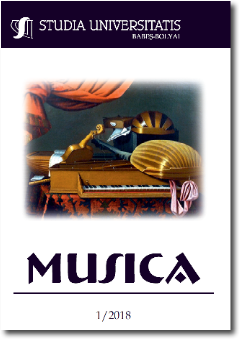THE DISSIDENCE OF MELODY IN ANATOL VIERU'S OEUVRE. CASE STUDY: THE QUOTATION OF THE
"FRÈRE JACQUES" SONG
THE DISSIDENCE OF MELODY IN ANATOL VIERU'S OEUVRE. CASE STUDY: THE QUOTATION OF THE
"FRÈRE JACQUES" SONG
Author(s): Olguța LupuSubject(s): Fine Arts / Performing Arts
Published by: Studia Universitatis Babes-Bolyai
Keywords: melody; Frère Jacques; modern music; Anatol Vieru; quotation.
Summary/Abstract: Melody (in the traditional sense of a hummable horizontal structure that is relatively easy to remember) faced a kind of censorship in the last century, being almost barred from the world of highbrow music. For post-WWII Romanian composers this sense of duress manifested itself in two different ways. On the one hand, the modes, dogmas and canons of contemporary classical music pushed melody towards a prohibited area. On the other hand, the Communist regime established a symbiotic relationship between melody and the propaganda message/text, which allowed the intelligentsia to imagine the act of refusing singability as a kind of separation from official ideology. Yet, despite these unfortunate circumstances, melody still remains one of the most efficient means of individualizing, of personalizing a musical structure. Perhaps more than for any of his peers, the longing for melody forced Vieru to find viable solutions to accommodate the somewhat clandestine passenger, while still remaining highly innovative. The work chosen for the case study is Narațiune II [Narrative II] for saxophone and orchestra (1985), in which Vieru creates a multi-layered dialogue through the insertion of the Frère Jacques song.
Journal: Studia Universitatis Babes-Bolyai - Musica
- Issue Year: 63/2018
- Issue No: 1
- Page Range: 105-116
- Page Count: 12
- Language: English

